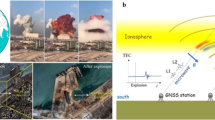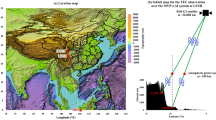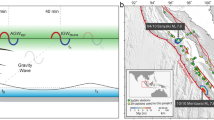Abstract
NORMAL ionospheric sounding technique can provide information on only the lower portion of the F-region, since waves capable of reaching beyond the level of maximum ionization are not returned to earth by any processes occurring within the ionosphere itself.
This is a preview of subscription content, access via your institution
Access options
Subscribe to this journal
Receive 51 print issues and online access
$199.00 per year
only $3.90 per issue
Buy this article
- Purchase on Springer Link
- Instant access to full article PDF
Prices may be subject to local taxes which are calculated during checkout
Similar content being viewed by others
References
Mofenson, J., Electronics, 19 (4), 92 (April, 1946).
Bay, Z., Hungaria Physica Acta, 1, 1 (1946).
Grieg, D. D., Metzger, S., and Waer, R., Proc. Inst. Rad. Eng., 36, 652 (1948).
Appleton, E. V., and Beynon, W. J. G., Proc. Phys. Soc., 52, 518 (1940); 59, 58 (1947).
Author information
Authors and Affiliations
Rights and permissions
About this article
Cite this article
KERR, F., SHAIN, C. & HIGGINS, C. Moon Echoes and Penetration of The Ionosphere. Nature 163, 310–313 (1949). https://doi.org/10.1038/163310a0
Issue Date:
DOI: https://doi.org/10.1038/163310a0
This article is cited by
-
Effet Faraday ionosphérique (I)
Zeitschrift für angewandte Mathematik und Physik ZAMP (1963)
-
Ionospheric Studies by the Lunar Radar Technique
Nature (1957)
Comments
By submitting a comment you agree to abide by our Terms and Community Guidelines. If you find something abusive or that does not comply with our terms or guidelines please flag it as inappropriate.



